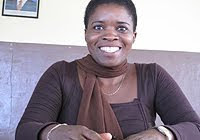By Joanna Martin and Jacqueline Namfua
HAI DISTRICT, Tanzania, 14 June 2011 – Child protection teams in the Kilimanjaro Region are joining forces to combat violence against children and ensure young people are treated with the respect and dignity they deserve.
Seeking justice
Zawadi (not her real name), 15, is a child abuse survivor. After her mother died, her stepfather sexually abused her repeatedly at the age of 12. It was a teacher who raised concerns and eventually accompanied Zawadi to the police station. “The state is now helping me,” she says. “I felt safe knowing in court he would no longer be able to abuse me.”
With the assistance of a child protection team in Hai District, the case was handled quickly and successfully. The perpetrator is serving a 30-year prison sentence, and Zawadi and her step sister now live with their foster mother.
“The district social welfare officer was heavily involved and supportive throughout the case,” says Zawadi’s foster mother, who praises the justice system’s response. “I accompanied her to court and her testimony was supported by the magistrate. The police were also in regular contact about the court date.”
In several districts across Kilimanjaro Region, the police, social welfare and education officers, magistrates and health workers have come together as a team and are creating a stronger system to protect children.
Protecting children
At Boma Ng’ombe police station, a special room has been set aside as a safe haven where women and children can report sensitive issues like violence and sexual abuse. UNICEF has supported training for more than 40 police officers who manage the children and gender desk.
“The training has helped because when a case reaches the police it is quickly processed. This is a great improvement compared with the past, when a case could go on for up to three months,” says Happiness Eliufoo, Police Officer at the Gender Desk in Hai District. “The police have become more sensitive towards children. As soon as a case is reported here, we know what steps to take.”
The child protection teams are critical in helping children to speak out and give sufficient evidence to build abuse cases. These cases are now given priority and bringing perpetrators to justice usually takes less than two weeks.
“We prioritize child cases considering the high level of child abuse in Hai District,” says Hai District Magistrate, Dennis Mpelembwa. “We listen to the cases in an informal setting, normally in a side chamber and strive to create a child-friendly atmosphere.”
 |
Helga Simon, a Social Welfare Officer in Hai District, Tanzania, is proud that the child protection teams in her region are making a difference. |
However, challenges remain. The police have no camera to document the signs of physical abuse on a victim, and cultural barriers in the community can stop children from reporting abuse and attending follow-up visits to the police station due to being too afraid.
Integrated teamwork
In many cases, justice relies solely on a child’s testimony as they are often the only witness to the crime. It’s why teamwork in the justice system is so important.
“There is a lot of networking here in Hai District. When a case comes to the attention of the police, they record details, then contact the social welfare department for psycho-social support,” says Social Welfare Officer, Helga Simon. “We communicate with the hospital and if the child needs medical attention, it is provided free of charge.”
A child protection system provides children with the added protection of having key sectors that form part of children's everyday lives work together in pursuit of a common goal – to prevent and respond to abuse and violence against children.
“They are finding the sum of their collective parts much more effective than when they used to work separately,” explains Andrew Brooks, UNICEF Chief of Child Protection in Tanzania, “each one drawing on their mandated role and specialized knowledge to ensure an holistic and efficient response to the vulnerable child."- By Joanna Martin and Jacqueline Namfua



No comments:
Post a Comment